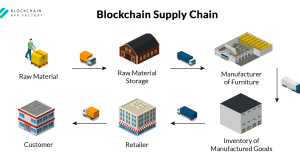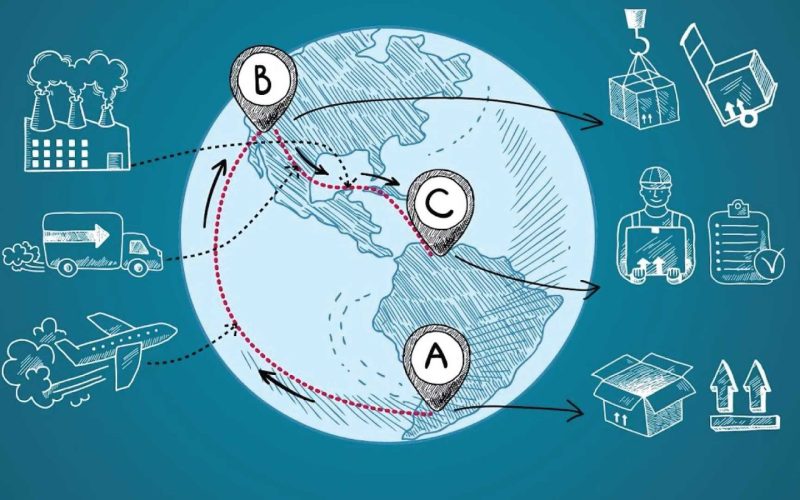Understanding the Basics of Blockchain on Supply Chain
Blockchain technology, primarily known for its role in cryptocurrency, is revolutionizing the supply chain industry. The integration of blockchain into supply chain management is creating a dynamic shift, enhancing transparency and traceability. It’s not just about recording transactions; it’s about recording every step of a product’s journey, from raw materials to the end consumer. This ensures the authenticity of products and prevents counterfeit or fraudulent activities. Moreover, the decentralized and immutable nature of blockchain ensures that no single entity has control over the information, adding an additional layer of security.
The Role of Blockchain in Enhancing Supply Chain Transparency

Blockchain technology is playing a pivotal role in enhancing supply network transparency. It revolutionizes transparency, efficiency, and security in supply network management. The blockchain ledger records every transaction and movement of goods, making it easy to track and trace products in real-time. This dynamic shift in supply network management with blockchain technology ensures that every stakeholder has access to the same information, reducing discrepancies and disputes. Moreover, it enhances security by preventing unauthorized access or alterations to the data.
Benefits of Integrating Blockchain into Supply Chain Management
The integration of blockchain into supply chain management brings numerous benefits. It enhances transparency, accountability, and efficiency. Every transaction is recorded on the blockchain, making it easy to trace products and transactions. This increased transparency leads to greater accountability as it becomes easier to identify and address any irregularities. Moreover, the automation of processes through smart contracts can significantly improve efficiency and reduce human errors. This dynamic shift from traditional supply chain processes to blockchain integration brings about a more streamlined, secure, and reliable supply network.
Challenges in Implementing Blockchain on Supply Chain
Despite its numerous benefits, implementing blockchain in the supply network presents certain challenges. Understanding the complexity of the technology and its integration into existing systems can be daunting. The dynamic shift caused by blockchain integration requires a thorough understanding of the technology and its implications. Moreover, the need for collaboration among all stakeholders, including suppliers, manufacturers, distributors, and retailers, can be a challenge. It requires a change in mindset and willingness to share information transparently.
Case Studies: Successful Implementation of Blockchain on Supply Chain
There are several case studies that highlight the successful implementation of blockchain in the supply network. For instance, Walmart uses blockchain technology to trace the origin of food products. This has enabled the company to quickly identify and remove contaminated food items, ensuring consumer safety. Another example is De Beers, which uses blockchain to trace the journey of diamonds from the mine to the consumer, ensuring they are conflict-free. These case studies demonstrate the dynamic shift that blockchain can bring in the supply network , enhancing transparency, efficiency, and security.
Future Trends: Blockchain on Supply Chain

The future trajectory of blockchain in the supply network looks promising. As more companies recognize the benefits of this technology, its adoption is likely to increase. Blockchain can create a dynamic shift in the supply network, making it more transparent, efficient, and secure. Moreover, the integration of blockchain with other emerging technologies like IoT and AI can further enhance its capabilities, leading to more innovative and efficient supply network solutions.
The Impact of Blockchain on Supply Chain Sustainability
Blockchain technology can also contribute to supply network sustainability. It reduces the ecological footprint by enhancing traceability. For instance, it can help track and reduce carbon emissions in the supply network. Moreover, it can ensure the ethical sourcing of materials by tracing their origin and ensuring they are not linked to deforestation, child labor, or other unethical practices. This represents a dynamic shift towards sustainable practices in the supply network.
Potential Risks and Mitigation Strategies in Blockchain on supply network
While blockchain offers numerous benefits, it also presents potential risks, such as data privacy concerns. Since blockchain records and shares information across the network, it raises concerns about the confidentiality of sensitive business information. However, these risks can be mitigated through robust security protocols within the blockchain. For instance, the use of private supply network can restrict access to authorized individuals. Moreover, the use of encryption can ensure the confidentiality of data. Thus, while blockchain can cause a dynamic shift in the supply network, it is essential to manage and mitigate potential risks effectively.












